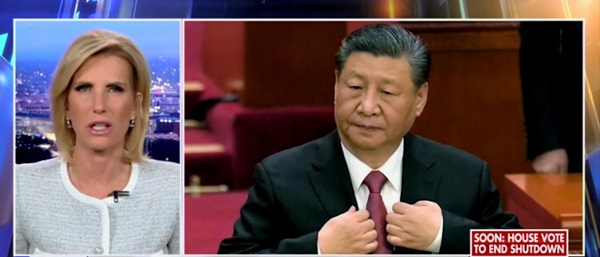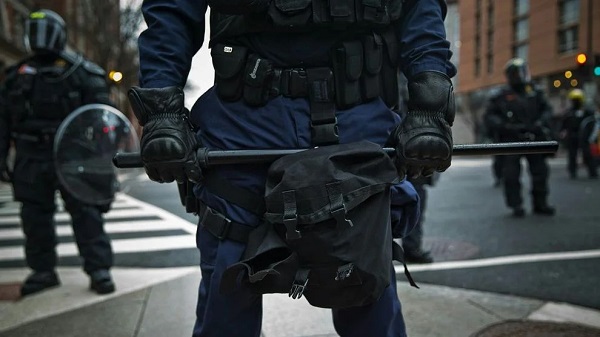Uncategorized
US official: US intel says prince ordered Khashoggi killing

WASHINGTON — U.S. intelligence officials have concluded that Saudi Crown Prince Mohammed bin Salman ordered the killing of journalist Jamal Khashoggi, a U.S. official said. The Saudi government has denied the claim.
The conclusion will bolster efforts in Congress to further punish the close U.S. ally for the killing. The Trump administration this past week penalized 17 Saudi officials for their alleged role in the killing, but American lawmakers have called on the administration to curtail arms sales to Saudi Arabia or take other harsher punitive measures.
The U.S. official familiar with the intelligence agencies’ conclusion was not authorized to discuss it publicly and spoke only condition of anonymity Friday. The conclusion was first reported by The Washington Post.
Saudi Arabia’s top diplomat has said the crown prince had “absolutely” nothing to do with the killing.
The United States will “follow the facts,” Pence said, while trying to find a way of preserving a “strong and historic partnership” with Saudi Arabia.
Khashoggi, a Saudi who lived in the United States, was a columnist for the Post and often criticized the royal family. He was killed Oct. 2 at the Saudi Consulate in Istanbul. Turkish and Saudi authorities say he was killed inside the consulate by a team from the kingdom after he went there to get marriage documents.
This past week, U.S. intelligence officials briefed members of the Senate and House intelligence committees and the Treasury Department announced economic sanctions on 17 Saudi officials suspected of being responsible for or complicit in the killing.
Among those targeted for sanctions were Mohammed al-Otaibi, the diplomat in charge of the consulate, and Maher Mutreb, who was part of the crown prince’s entourage on trips abroad.
The sanctions freeze any assets the 17 may have in the U.S. and prohibit any Americans from doing business with them.
Also this past week, the top prosecutor in Saudi Arabia announced he will seek the death penalty against five men suspected in the killing. The prosecutor’s announcement sought to quiet the global outcry over Khashoggi’s death and distance the killers and their operation from the kingdom’s leadership, primarily the crown prince.
President Donald Trump has called the killing a botched operation that was carried out very poorly and has said “the
But he has resisted calls to cut off arms sales to the kingdom and has been reluctant to antagonize the Saudi rulers. Trump considers the Saudis vital allies in his Mideast agenda.
The Post, citing unnamed sources, also reported that U.S. intelligence agencies reviewed a phone call that the prince’s brother, Khalid bin Salman, had with Khashoggi. The newspaper said the prince’s brother, who is the current Saudi ambassador to the United States, told Khashoggi he would be safe in going to the Saudi Consulate in Istanbul to retrieve the documents he needed to get married.
The newspaper said it was not known whether the ambassador knew Khashoggi would be killed. But it said he made the call at the direction the crown prince, and the call was intercepted by U.S. intelligence.
Fatimah Baeshen, a spokesperson for the Saudi Embassy in Washington, said that claim was false.
She said in a statement issued to The Associated Press that the ambassador met Khashoggi in person once in late September 2017. After that, they communicated via text messages, she said. The last text message the ambassador sent to Khashoggi was on Oct. 26, 2017, she said.
Baeshen said the ambassador did not discuss with Khashoggi “anything related to going to Turkey.”
“Ambassador Prince Khalid bin Salman has never had any phone conversations with him,” she said.
“You are welcome to check the phone records and
The ambassador himself tweeted: “The last contact I had with Mr. Khashoggi was via text on Oct. 26, 2017. I never talked to him by phone and certainly never suggested he go to Turkey for any reason. I ask the U.S. government to release any information regarding this claim.”
Deb Riechmann, The Associated Press
Uncategorized
Trump Admin Establishing Council To Make Buildings Beautiful Again


From the Daily Caller News Foundation
By Jason Hopkins
The Trump administration is creating a first-of-its-kind task force aimed at ushering in a new “Golden Age” of beautiful infrastructure across the U.S.
The Department of Transportation (DOT) will announce the establishment of the Beautifying Transportation Infrastructure Council (BTIC) on Thursday, the Daily Caller News Foundation exclusively learned. The BTIC seeks to advise Transportation Secretary Sean Duffy on design and policy ideas for key infrastructure projects, including highways, bridges and transit hubs.
“What happened to our country’s proud tradition of building great, big, beautiful things?” Duffy said in a statement shared with the DCNF. “It’s time the design for America’s latest infrastructure projects reflects our nation’s strength, pride, and promise.”
“We’re engaging the best and brightest minds in architectural design and engineering to make beautiful structures that move you and bring about a new Golden Age of Transportation,” Duffy continued.
Mini scoop – here is the DOT’s rollout of its Beautifying Transportation Infrastructure Council, which will be tasked with making our buildings beautiful again. pic.twitter.com/
9iV2xSxdJM — Jason Hopkins (@jasonhopkinsdc) October 23, 2025
The DOT is encouraging nominations of the country’s best architects, urban planners, artists and others to serve on the council, according to the department. While ensuring that efficiency and safety remain a top priority, the BTIC will provide guidance on projects that “enhance” public areas and develop aesthetic performance metrics.
The new council aligns with an executive order signed by President Donald Trump in August 2025 regarding infrastructure. The “Making Federal Architecture Beautiful Again” order calls for federal public buildings in the country to “respect regional architectural heritage” and aims to prevent federal construction projects from using modernist and brutalist architecture styles, instead returning to a classical style.
“The Founders, in line with great societies before them, attached great importance to Federal civic architecture,” Trump’s order stated. “They wanted America’s public buildings to inspire the American people and encourage civic virtue.”
“President George Washington and Secretary of State Thomas Jefferson consciously modeled the most important buildings in Washington, D.C., on the classical architecture of ancient Athens and Rome,” the order continued. “Because of their proven ability to meet these requirements, classical and traditional architecture are preferred modes of architectural design.”
The DOT invested millions in major infrastructure projects since Trump’s return to the White House. Duffy announced in August a $43 million transformation initiative of the New York Penn Station in New York City and in September unveiledmajor progress in the rehabilitation and modernization of Washington Union Station in Washington, D.C.
The BTIC will comprise up to 11 members who will serve two-year terms, with the chance to be reappointed, according to the DOT. The task force will meet biannually. The deadline for nominations will end Nov. 21.
Uncategorized
New report warns WHO health rules erode Canada’s democracy and Charter rights

The Justice Centre for Constitutional Freedoms has released a new report titled Canada’s Surrender of Sovereignty: New WHO health regulations undermine Canadian democracy and Charter freedoms. Authored by Nigel Hannaford, a veteran journalist and researcher, the report warns that Canada’s acceptance of the World Health Organization’s (WHO) revised International Health Regulations (IHR) represents a serious erosion of national independence and democratic accountability.
The IHR amendments, which took effect on September 19, 2025, authorize the WHO Director-General to declare global “health emergencies” that could require Canada to follow directives from bureaucrats in Geneva, bypassing the House of Commons and the will of Canadian voters.
The WHO regards these regulations as “binding,” despite having no ability or legal authority to impose such regulations. Even so, Canada is opting to accept the regulations as binding.
By accepting the WHO’s revised IHR, the report explains, Canada has relinquished its own control over future health crises and instead has agreed to let the WHO determine when a “pandemic emergency” exists and what Canada must do to respond to it, after which Canada must report back to the WHO.
In fact, under these International Health Regulations, the WHO could demand countries like Canada impose stringent freedom-violating health policies, such as lockdowns, vaccine mandates, or travel restrictions without debate, evidence review, or public accountability, the report explains.
Once the WHO declares a “Pandemic Emergency,” member states are obligated to implement such emergency measures “without delay” for a minimum of three months.
Importantly, following these WHO directives would undermine government accountability as politicians may hide behind international “commitments” to justify their actions as “simply following international rules,” the report warns.
Canada should instead withdraw from the revised IHR, following the example of countries like Germany, Austria, Italy, Czech Republic, and the United States. The report recommends continued international cooperation without surrendering control over domestic health policies.
Constitutional lawyer Allison Pejovic said, “[b]y treating WHO edicts as binding, the federal government has effectively placed Canadian sovereignty on loan to an unelected international body.”
“Such directives, if enforced, would likely violate Canadians’ Charter rights and freedoms,” she added.
Mr. Hannaford agreed, saying, “Canada’s health policies must be made in Canada. No free and democratic nation should outsource its emergency powers to unelected bureaucrats in Geneva.”
The Justice Centre urges Canadians to contact their Members of Parliament and demand they support withdrawing from the revised IHR to restore Canadian sovereignty and reject blind compliance with WHO directives.
-

 Daily Caller2 days ago
Daily Caller2 days agoLaura Ingraham’s Viral Clash With Trump Prompts Her To Tell Real Reasons China Sends Students To US
-

 Frontier Centre for Public Policy2 days ago
Frontier Centre for Public Policy2 days agoRichmond Mayor Warns Property Owners That The Cowichan Case Puts Their Titles At Risk
-

 Business2 days ago
Business2 days agoSluggish homebuilding will have far-reaching effects on Canada’s economy
-

 Business2 days ago
Business2 days agoMark Carney Seeks to Replace Fiscal Watchdog with Loyal Lapdog
-

 Business7 hours ago
Business7 hours agoParliamentary Budget Officer begs Carney to cut back on spending
-

 Censorship Industrial Complex23 hours ago
Censorship Industrial Complex23 hours agoEU’s “Democracy Shield” Centralizes Control Over Online Speech
-

 International24 hours ago
International24 hours agoBondi and Patel deliver explosive “Clinton Corruption Files” to Congress
-

 International23 hours ago
International23 hours agoState Department designates European Antifa groups foreign terror organizations









